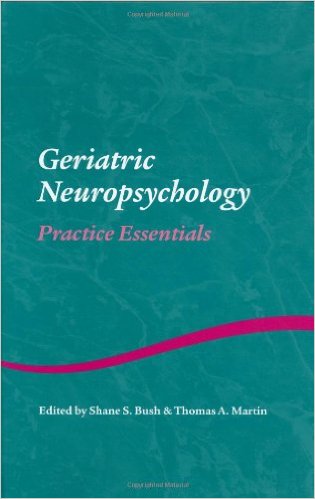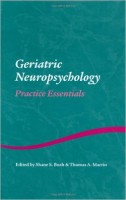Editors: Shane S. Bush, PhD, and Thomas A. Martin, PsyD
Series Editor: Linas A. Bieliauskas
Publisher: Psychology Press (Taylor & Francis Group) – 552 pages
Book Review by: Nano Khilnani
This is an extensive volume of over 550 pages on the practice of neuropsychology with older patients. It covers the essential elements of this field of medicine, drawing together recent research findings. Much of the knowledge contained in it is meant to be for specific use in treating senior members of the population, but some of it is applicable to adults of all ages.
The editors, Drs. Shane S. Bush and Thomas A. Martin, assert that geriatric neuropsychologists must acquire and maintain a working knowledge of relevant areas of genetics, geriatrics, general medicine, pharmacology, and psychology. They must also stay abreast of advances in multiple, interrelated fields in health care and scientific fields.
Forty-two specialists in neuropsychology, general psychology, rehabilitation psychology, and related fields, working at schools of medicine and hospitals all over the United States, wrote the 19 chapters of this book organized around four Sections. The titles of the chapters are:
- Section I : Introduction
- Introduction
- Section II: Assessment
- The Clinical interview
- Selection and use of screening measures in geriatric neuropsychology
- Neuropsychological batteries for older adults
- Applications of technology to assessment and intervention with older adult2
- Test modifications in geriatric neuropsychology
- Cultural considerations in the neuropsychological assessment of older adults
- Structural and functional neuroimaging findings in normal and pathological aging
- Section III: Neuropsychological disorders
- Neuropsychology of Alzheimer’s disease and other dementias
- Cerebrovascular disorders: neurocognitive and neurobehavioral features
- Neuropsychology of Parkinson’s disease and other dementias
- Traumatic brain injury and the older adult
- Clinical considerations.
- Co-occurring psychiatric and neurological impairments in older adults
- Sleep disorders and geriatric neuropsychology
- Geriatric pain and neuropsychological assessment
- Geriatric psychopharmacology
- Substance abuse in older adults
- Neuropsychologists as family service providers after the onset of neurological disorders in older adults
- Decision-making capacity in the impaired older adult
- Ethical issues in geriatric neuropsychology
- Appendix: Resources for the practice of geriatric neuropsychology
This book covers the psychological effects of traumatic brain injury, cerebrovascular, neurobehavioral, neurocognitive, and neurological diseases upon older adults. Motor and movement disorders such as Parkinson’s, and many other issues of older adults are covered in this volume. The list of chapter titles above gives you, the practitioner or student of neuropsychology, an overview of what you will find in it.
The Introduction to this book also gives you a better idea of not only what is contained in this book but also coverage of several aspects of a typical geriatric neuropsychologist’s practice. These are some of those aspects:
- Settings – Places where older adults undergo initial neuropsychological evaluation.
- Referral questions – Questions that neuropsychologists ask to identify areas of brain damage or impairment, clarify the etiology of cognitive dysfunction, and identify cognitive strengths and weaknesses.
- Diagnosis – Assessment of dementia, age-related cognitive decline, neurocognitive loss, and integrating emotional and personality factors into diagnostic considerations.
- Treatment – This frequently involves providing education and emotional support to patients and their families, and management of behavioral issues that may arise. Also, “the introduction of cholinergic medications in recent years has challenged the notion that the course of cognitive decline cannot be altered,” the editors write.
- Consumer education / prevention – Healthy lifestyle choices may promote neurological wellness, reduce the risk of Alzheimer’s disease, and improve cognitive functioning in those experiencing early cognitive decline, recent research results have shown. Promoting this information can help prevent people from developing neurological disorders.
- Conclusion – There will be greater need for geriatric neuropsychologists as the world’s aging population continues to grow, and people’s life expectancy continues to rise. These medical specialists, working with other health care and social service providers, family members and consumers, can do much to improve the lives of the elderly population.
Editors:
Shane S. Bush, PhD, ABPN, ABPP is in independent practice in Smithtown, New York. He is board certified in Neuropsychology by the American Board of Professional Neuropsychology and in Rehabilitation Psychology by the American Board of Professional Psychology. He is president of the Neuropsychology Division of the New York State Psychological Association.
He serves on the editorial boards of The Clinical Neuropsychologist (co-editing the Ethical and Professional Issues section), the Journal of Forensic Neuropsychology, and Applied Neuropsychology. He is co-editor of the book Ethical Issues in Clinical Neuropsychology, editor of Casebook of Ethical Issues in Neuropsychology, and coauthor of Health Care Ethics for Psychologists: A Casebook. He has presented at national psychology, neuropsychology, and rehabilitation psychology conferences.
Thomas A. Martin, PsyD, ABPP is chief of psychology services at Missouri Rehabilitation Center and a Clinical Assistant Professor in the Department of Health Psychology at the University of Missouri – Columbia. He earned his doctoral degree from the Adler School of Professional Psychology and completed a post-doctoral fellowship in Clinical Neuropsychology and Rehabilitation Psychology at the University of Missouri – Columbia. He is board certified in Rehabilitation Psychology by the American Board of Professional Psychology.
He currently serves on the Board of Directors of the Brain Injury Association of Missouri, is a member of the Social and Ethical Responsibility Committee of APA’s Division of Rehabilitation Psychology, and is a member of the Education Committee of the National Academy of Neuropsychology. He has published in the areas of Clinical Neuropsychology, and is currently conducting research in the area of traumatic brain injury and treatment outcomes.








